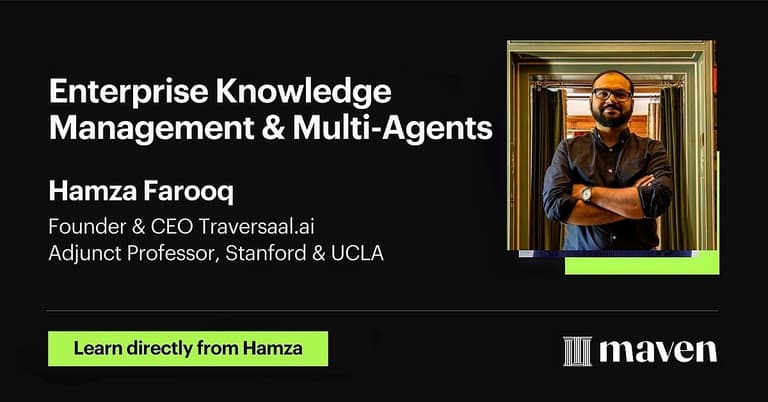Agent Engineering Bootcamp: Developers Edition
Hamza Farooq
Founder | Ex-Google | Prof UCLA & UMN
Zain Hasan
Staff AI @Together AI | Founder


The Agent Technical Course: Build and Deploy Production-Grade Gen AI Products
A 7-week technical deep dive for AI builders ready to design agent systems that reason, route, and adapt.
7 instructor-led sessions · 7 office hours · 1 Demo Day
What You'll Build1. Agentic RAG with Routers Master stateful RAG with intelligent routing, reflection, memory, and multi-hop search strategies beyond naive cosine similarity.
2. Hosting & Quantizing LLMs: Deploy production-grade models using GPTQ/GGUF quantization via Ollama (local) and RunPod (cloud) with FastAPI and auto-scaling.
3. Semantic Caching: Build cache layers from scratch using vector proximity and feedback loops to reduce latency and costs.
4. Knowledge Graphs Implement graph-based memory with text-to-Cypher generation using Neo4j/Memgraph and DSPy for structured reasoning.
5. ReAct Agents Create Reason+Act pipelines in Python and n8n for human-in-the-loop workflows with visual orchestration.
6. Production Deployment Ship multi-agent systems using Google's ADK, MCP, A2A collaboration, Llama Guard safety rails, and GCP monitoring.
Prerequisites: RAG/LLM experience, Python, APIs, cloud basics
👉 This course is for builders who ship real AI.
What you’ll learn
Master Advanced Techniques for Building and Optimizing Agentic RAG Systems and Multi-Agent Workflows — Designed for Builders
Design and deploy intelligent retrieval systems that reason, route queries, and adapt across multi-turn conversations—far beyond naive RAG
Framework: Implement stateful RAG architectures with routers, reflection loops, and multi-hop reasoning strategies
Hands-on: Build custom routing logic that knows when cosine similarity fails and switches between retrieval strategies
Host, quantize, and serve production LLMs locally and in the cloud with cost-efficiency and low latency
Technical deep-dive: Master quantization techniques (GPTQ, GGUF, QLoRA) to reduce model size by 4-8x without sacrificing performance
Infrastructure: Deploy models using Ollama (local), RunPod (cloud), and FastAPI with auto-scaling capabilities
Outcome: Build intelligent caching layers that recognize similar queries, avoid redundant LLM calls, and improve over time.
From scratch: Code semantic distance functions using vector embeddings and proximity thresholds
Architecture: Discussion on cache hit/miss systems with reranking and feedback loops that learn from usage patterns
Outcome: Move beyond flat retrieval to structured reasoning by building graph-based memory with natural language to Cypher query generation
Modeling: Design graph schemas for agent memory, extracting entities and relationships from unstructured text
Tools: Implement with Neo4j or Memgraph and connect to RAG pipelines for context-aware graph traversal
Outcome: Deploy coordinated multi-agent workflows with agent-to-agent communication, human-in-the-loop patterns, and production guardrails.
ReAct paradigm: Build modular Reason+Act pipelines with tool use, planning, and reflection in both Python and n8n
ADK & MCP: Combine Google's Agent Development Kit with Modular Cognitive Planning for enterprise-grade orchestration
Who this course is for
Machine Learning Engineer exploring different techniques to scale LLM solutions
Researcher, who would like to delve in to various aspects of open-source LLMs
Software Engineer, looking to learn how to integrate AI into their products
What's included
Live sessions
Learn directly from Hamza Farooq & Zain Hasan in a real-time, interactive format.
Lifetime access
Go back to course content and recordings whenever you need to.
Community of peers
Stay accountable and share insights with like-minded professionals.
Certificate of completion
Share your new skills with your employer or on LinkedIn.
Maven Guarantee
This course is backed by the Maven Guarantee. Students are eligible for a full refund through the second week of the course.
Course syllabus
11 live sessions • 43 lessons • 6 projects
Week 1
Apr
11
Session 1: World of Agents & Quantization
Optimizing and Deploying Large Language Models
Recordings on Transformers
Week 2
Apr
15
Office Hours
Apr
18
Session 2: KV Caching and Speculative Decoding
KV Caching and Speculative Decoding
Free resource

Enterprise Knowledge Management and Multi-Agent Architecture
Streamlining Knowledge Access with Enterprise RAG
RAG breaks down data silos, enabling seamless access to Enterprise Knowledge for smarter, faster decision-making.
Empowering Decision-Making with AI Agents
Multi-agent systems automate workflows, enhance collaboration, and provide real-time support for complex tasks.
Explore Practical Applications of AI Agents
Get hands-on insights into building AI agents from scratch, understanding their architecture, and deploying them.
Schedule
Live sessions
2-3 hrs / week
Sat, Apr 11
4:00 PM—6:00 PM (UTC)
Wed, Apr 15
4:00 PM—4:45 PM (UTC)
Sat, Apr 18
4:00 PM—6:00 PM (UTC)
Projects
1-3 hrs / week
Async content
1-3 hrs / week
Frequently asked questions
$2,500
USD







